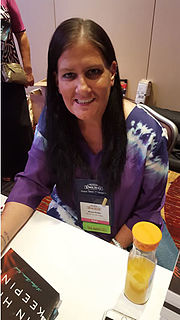A Quote by Lisi Harrison
A good boss asks what part she could have played in the problem. And then she asks herself what she can do better next time.
Related Quotes
She emptied herself of Fabio and of herself, of all the useless efforts she had made to get where she was and find nothing there. With detached curiosity she observed the rebirth of her weaknesses, her obsessions. This time she would let them decide, since she hadn't been able to do anything anyway. Against certain parts of yourself you remain powerless, she said to herself, as she regressed pleasurably to the time when she was a girl.
although she went home that night feeling happier than she had ever been in her short life, she did not confuse the golf course party with a good party, and she did not tell herself she had a pleasant time. it had been, she felt, a dumb event preceded by excellent invitations. what frankie did that was unusual was to imagine herself in control. the drinks, the clothes, the instructions, the food (there had been none), the location, everything. she asked herself: if i were in charge, how could i have done it better?
What do you do?' she asks, holding out the vest. 'What do you do?' 'What do you do?' she asks, her voice shaking. 'Don't ask me, please. Okay, Clay?' 'Why not?' She sits on the mattress after I get up. Muriel screams. 'Because... I don't know,' she sighs. I look at her and don't feel anything and walk out with my vest.
She wanted happily ever after more than he could possibly know. She wanted forever. Problem was, she just wasn’t sure she believed in it anymore. It was why she clung to her fiction so much. She immersed herself in books because there she could be anyone and it was easy to believe in love and happily ever after
Whenever I visit Korea she [Kang] buys me lunch and takes me to a gallery. As if all this wasn't enough, she has incredible respect for translation as a creative, artistic practice - she insists that each English version is 'our book', offered to share her fees with me when she found out I wasn't getting paid for translating her publicity stuff, always asks the editor to credit me, and does so herself whenever she's interviewed. Too good to be true.
She bent her finger and then straightened it. The mystery was in the instant before it moved, the dividing moment between not moving and moving, when her intention took effect. It was like a wave breaking. If she could only find herself at the crest, she thought, she might find the secret of herself, that part of her that was really in charge. She brought her forefinger closer to her face and stared at it, urging it to move. It remained still because she was pretending... . And when she did crook it finally, the action seemed to start in the finger itself, not in some part of her mind.
When she walks she walks with passion when she talks, she talks like she can handle it when she asks for something, boy she means it she know you would do [anything] to keep her by your side she'll make you work hard make you spend hard make you want all, all of her she'll make you fall real fast [in love].
...fact was she knew more about them than she knew about herself, having never had the map to discover what she was like. Could she sing? (Was it nice to hear when she did?) Was she pretty? Was she a good friend? Could she have been a loving mother? A faithful wife? Have I got a sister and does she favor me? If my mother knew me would she like me? (140)
What would you do if you could fly?" Mrs. V asks as she glances from the bird to me. "Is that on the quiz?" I ask, grinning as I type. "I think we've studied just about everything else." Mrs. V chuckles. "I'd be scared to let go," I type. "Afraid you'd fall?" she asks. "No. Afraid it would feel so good, I'd just fly away.
Ultimately I think I learned a lot from my mother - the way she used fashion to make herself feel better; it was a tool she had and she used it very well. Fashion for her wasn't so far as an escape, but certainly a time where she would sit on her own and prepare what she wanted to wear the next day - it turned into bit of a ritual.






































